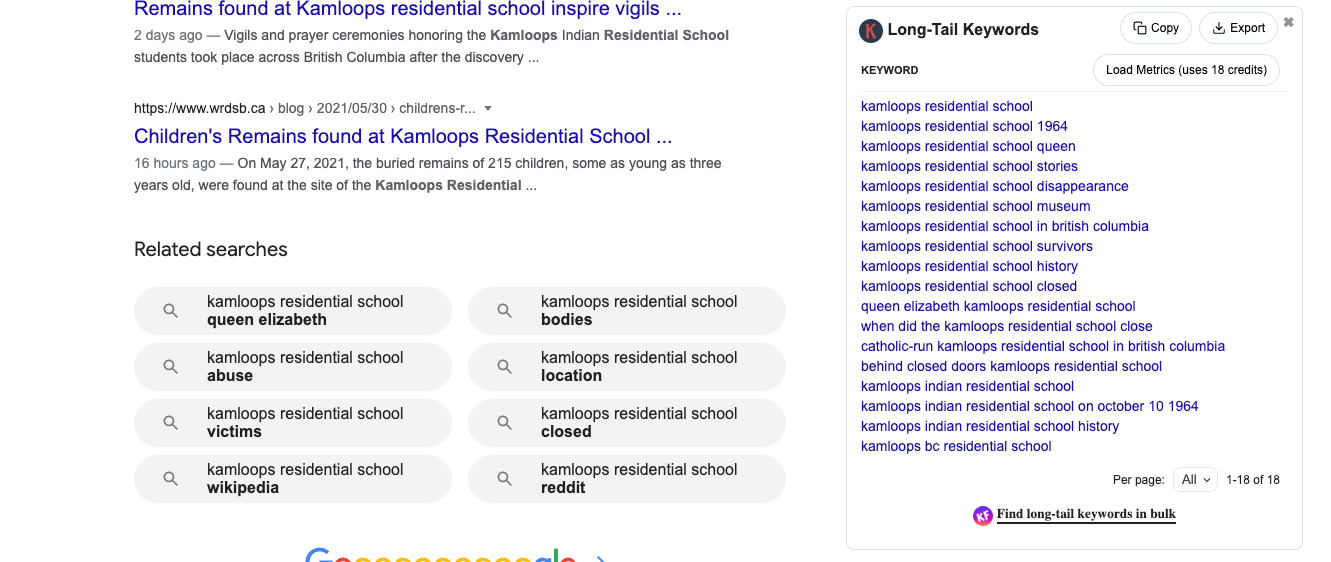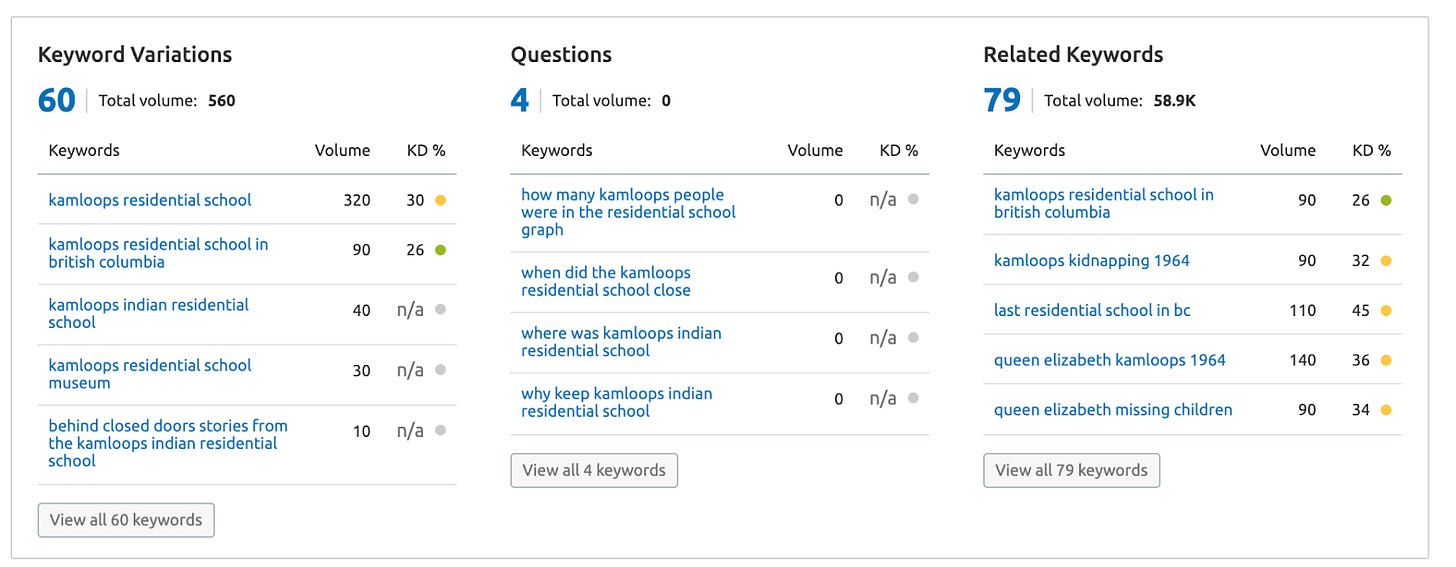How TF do I … find the top-referring keyword for a news story?
In issue no. 17, we walk through the process for finding the top keywords for a news story.
Hello and welcome back to another issue of WTF is SEO?
It’s Shelby at the helm today, taking you through the first of our “How TF do I do this?” series, where we’ll break down one of the methods that will help you improve your SEO with step-by-step instructions (cue Gritty.gif).
Also: I’ve been particularly affected by the news that 215 children’s remains were found at the Kamloops Residential School this past week. If you have the means, please donate to support the Indigenous communities across Canada that need help the most.

THE BREAKDOWN
How we’re going to do this: Finding top-referring keywords
Today, we’re going to follow the process I (Shelby) use to find top-referring keywords or key phrases for a story. Let's start by asking a few questions:
What do people search most to find information about this particular topic?
What is the main-focus keyword?
What is the secondary keyword(s)?
What other avenues should we explore?
Are there any breakout opportunities?
Remember! SEO is fun because there is no one right way to do it. What may work for me doesn’t always work for everyone else. Be sure to explore different tools or options that help you identify the best referring keywords for your audience.
Today’s topic will be around the residential school remains. I will be showing you how to use a current issue to build out your keyword focus.
🔗 Read more: Moz’s Keyword research or our guide to keyword research for news
THE KNOW HOW
How to identify top-referring keywords for your story
Quick! Your editors come to you and ask you to identify the top-referring keywords around the Kamloops residential school news.
If you are a visual learner, I broke down my process in this video. If you have questions, feel free to email me and we can discuss further.
Let’s start by looking up the current state of the story on search. This story broke on May 28 and gained interest over the weekend. We want to find what we think will be the top-referring keyword for our future coverage.
From what I’ve read around the story, “Kamloops residential school” seems like a good place to start. So, I start by Googling this keyword (the keyword I would search).
I use the Keywords Everywhere Chrome extension, which gives me search volume and trend data right in my SERPs. Here, I can see that there are 320 searches per month for this keyword, but a large breakout for the past week (over 4,000 searches!).
I want to explore this further, so I look at Keyword Everywhere’s long-tail keywords section.
I am interested in this list – it won’t offer a top-referring keyword, but could be some good avenues to explore in supplementary reporting or explainers. I will copy this list and create a Google spreadsheet with the search volume for each keyword (tip: use sheets.new in your URL bar to quickly make a new spreadsheet!)
(I highlight “kamloops indian residential school” because there seems to be some interest here too, and I want to explore its intent a bit more later.)
I now have a wealth of data on some keywords that could shape future stories, but I’m still not sure if kamloops residential school is the best approach. So, now I’ll move to Google Trends to see how the term compares to other terms.
Google Trends defaults to 12 months, but since we’re looking at a timely story, and I know it began on Thursday, I’m going to change my analysis to be seven days. From there, I can see an hour-by-hour breakdown of when “kamloops residential school” began to spike and if it’s still the best one to use.
Google Trends tells me this term had some huge interest around midnight and is continuing into the morning, even if it’s not as high as the original spike. We know the story is holding in terms of interest, particularly if you search “kamloops residential school.” This makes me want to stay with this term.
I also compare some terms to see how they’re doing in reference to another; perhaps one took over for the other at some point.
My final check before I stick with a particular keyword is to check the keyword difficulty for the term I’ve decided on. Keyword difficulty refers to how hard or complicated it can be to rank for this keyword in reference to what is already ranking well. This helps us understand the amount of effort we’ll need to rank well for the term.
For this today, I’m using SEMRush, but you can use Ahrefs, Moz or any other keyword research tool that will give you the comparative difficulty.
SEMRush tells me that “kamloops residential school” is possible – essentially, that there’s a ton of content for this term, but if we add some additional information and structure the story well, we can help our audience find information. Perhaps I can use some of these keyword variations or questions to help improve my content!
Based on this SEO research, we know that “kamloops residential school” is the phrase that we should include in our coverage. Use this phrase in your headlines, a variation or related phrase in your meta descriptions (often the sub-title or dek), and in the body of your story.
After the story: Do you want to check what’s actually referring traffic to your site? Use Google Search Console to see where the clicks and impressions came from – maybe you ranked for a keyword you didn’t expect to.
Best practices:
Use multiple tools and don’t get stuck in one way. Experiment with what works for you!
Make a list of all keywords around a topic. The top-referring one will drive the most traffic, but another term may drive a more engaged group of people.
Humblebrag & tip: I’ve been doing this for a while, so my sense of which keyword will do well is quite high. If you don’t know which keyword will do the best right off the bat, that’s okay! It’s all trial and error to help your team understand.
✔️ Action item: Run through a step-by-step process on your own time to see if you can identify the top-referring keyword for a story. Is the keyword the best one for your team to use?
The bottom line: Identifying the top-referring keyword for a story or topic is a lot of trial and error, and you want to use as many tools as possible to identify the best way to approach the term to help your traffic.
FUN + GAMES
SEO quiz
How many factors does Google use to help rank content?
4
Over 1,000
1 – quality content.
Over 200.
RECOMMENDED READING
NEXT WEEK: What should we cover next?
We have a new news product (podcast/newsletter etc). What’s my SEO checklist?
We covered XYZ story. How do we know if we captured/responded to search?
Have something you’d like us to discuss? Send us a note on Twitter (Jessie or Shelby) or to our email: seoforjournalism@gmail.com
(Don’t forget to bookmark our glossary.)
FUN + GAMES
The answer: Over 200.
Written by Jessie Willms and Shelby Blackley.







